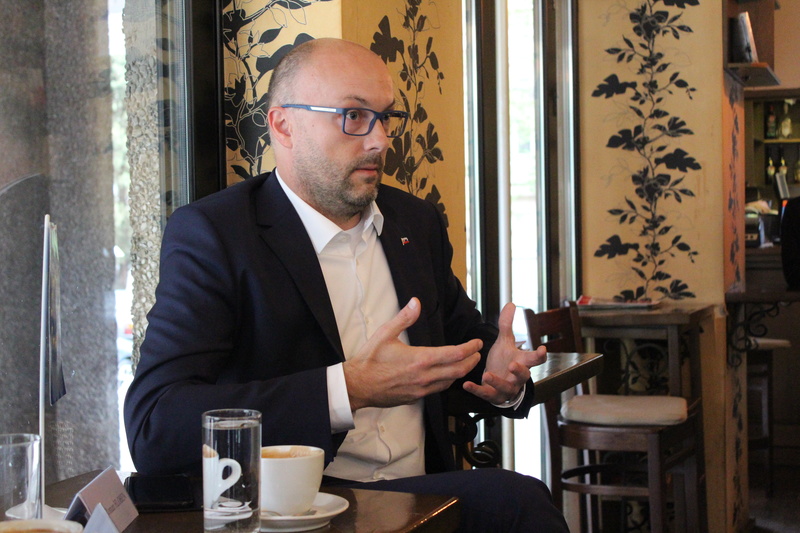Roman Hloben, ambassador of Republic of Slovakia in Montenegro, was the guest of the first European café for young people, organised by the Centre for Civic Education (CCE) in cooperation with the European Alternatives, where he spoke about the “EU – 60 years after the Treaty of Rome”.
Ana Nenezić, programme coordinator of Europeanisation and democratisation at the CCE, opened the European café for young people and pointed out that “European unity began as dream of a few, and grew into a hope of many. In times when the EU is going through numerous crisis and internal process of reforms, one should underline the achieved results, as well as the values which gathered member states”. She reminded that Brexit has shook the foundations of EU, along with many other challenges, but that it has also “contributed to more decisive and firm stand on changes that are necessary and that will make the EU stronger. Signing of Rome declaration by 27 leaders of member states, European Council, European Parliament and European Commission precisely on the 60th anniversary of the signing of Treaty of Rome constitutes the move in that direction”. Nenezić assessed that position of Montenegro, which is deeply into accession negotiation process and has achieved certain results, “will depend greatly on the dynamics of solving the internal issues within the Union. However, this must not be an alibi for the reform “fatigue” in Montenegro, because our results will depend exclusively on the quality of work of decision-makers, their dedication and responsibility, hence there can be no excuse for all the more evident impediment of essential reforms in Montenegrin society”.
Miloš Knežević, coordinator of the CCE youth group, has welcomed the participants on the behalf of the organiser and highlighted the importance of inclusion of young people in the “discussion on European Union, changes implied by the accession, and those that are about to take place in the EU”. He expressed satisfaction due to the fact that first European café for young people was opened with a topic which causes great controversy in the EU, but which is insufficiently discussed in Montenegro, and thanked H.E. Hloben who made the effort to bring closer “the European discussions” to young people in Montenegro.
After the opening remark, Roman Hloben, ambassador of Republic of Slovakia in Montenegro, discussed three aspects with the participants: European Union in times of challenges, Will EU overcome its current crisis and where is Montenegro on EU’s agenda?
Ambassador has reminded that everyone was affected by Brexit, especially since it came ahead of the chairmanship of Republic of Slovakia: “Great task lies before the EU in terms of changing the current situation for better. Everyone was in a state of panic and shock, but they soon realised that this might be the opportunity to create better Europe after the Brexit. Bratislava process was launched in this regard, with the aim to allow the EU to reflect on itself”. He reminded of the importance of White Book which contains several options regarding the manner “in which we want to build and change the EU”. Hloben also reminded that Slovakia would not have survived had it not been part of the EU and NATO and that there are many concrete reasons for that. It was able to become the largest car manufacturer in the world from a poor country only through the membership in EU and NATO.
“Political elites within the EU have understood the importance of listening about the needs of their citizens. Even though the elites do not agree on every issue regarding the outlook of EU, they agree on one important issue which is the preservation of most successful European project after World War II”, he emphasised.
Furthermore, ambassador Hloben assessed that Montenegro may still not be able to join the EU, but that it will join NATO no later than 1 June 2017, maybe even before that, and according to him, that counts as our second greatest achievement after the renowal of independence. He stated that EU and NATO are connected vessels which guarantee stability, security, economic development and prosperity to Montenegro.
“EU has the capacity to overcome Brexit, and I believe that time will come when Britain will regret its decision to leave the EU. In spite of the problems which nobody disputes, nobody doubts that European story is miraculous and that there is no better concept than that”, Hloben concluded.
This is CCE’s first time cooperation with European Alternatives, transnational organisation which promotes democracy, equality and culture, by advocating an alternative Europe where creative cultures have the power to question and go beyond the borders of states, emphasizing critical thinking and where informed critical public is involved in social change.
In this framework, European alternatives have supported the European café for young people, precisely to make an informal and innovative platform for young people to discuss with decision-makers, experts and representatives of diplomatic corps in order to better inform and understand the complex process of Montenegro’s accession to EU, as well as the dominant discourse on “crisis” and “threats” within the EU.
The event gathered 25 young activists.
Svetlana Pešić, programme associate

